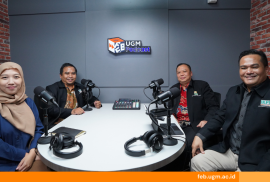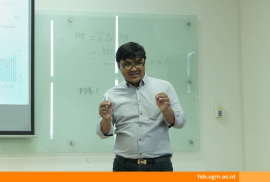Wednesday (12/07), the Faculty of Economics and Business, Universitas Gadjah Mada (FEB UGM), held an Executive Talk, which presented Ramavito Mountaino as a guest speaker. He is the Co-Founder and CFO of Eden Farm. The theme discussed in this lecture is “Ethics in the Labor Market”. The activity was carried out attractively on the 8th floor of the FEB UGM Learning Center Building. This is the 10th lecture of the Global Summer Week Series in 2023.
Eden Farm is a business-to-business (B2B) food supply chain company. Ramavito said that Indonesia has many intermediaries in the food supply chain, which causes a waste of time and costs. Eden Farm seeks to solve this problem by becoming a single intermediary by consolidating the demand and supply sides through technology. In its operations, Eden Farm distributes food ingredients from more than 5,000 local farmers to more than 50,000 culinary businesses throughout Indonesia.
Next, Ramavito explained the various employment statuses in Indonesia. He also discussed work agreements. In Indonesia, companies and workers can freely determine the contents of the work agreement as long as it does not conflict with applicable law. This rule is the principle of freedom of agreement which provides flexibility in managing work relations between companies and employees. Ramavito also emphasized the objectives of the employment relationship, namely to optimally utilize the workforce and provide legal protection to create welfare for the workforce.
There are four types of work relationships: work agreements for a particular time (PKWT), work agreements for an unspecified time (PKWTT), freelance daily workers, and outsourcing. Workers are entitled to salary, days off, BPJS membership, and holiday allowances (THR). Companies can provide other optional benefits, such as family allowances, annual bonuses and birthday leave. Furthermore, Ramavito explained about partnership. It is business cooperation between companies and partners based on needs, trust, strengths, and profits. There are three types of partnership workers, namely part-time, freelance and online drivers.
At the end of the session, Ramavito discussed the gig economy era, a labour market synonymous with short-term contract employees or freelancers. The estimation of digital short-term contract workers in Indonesia is enormous, reaching 1.2 million. The fields that make up the majority (49.47%) are multimedia and creative. Meanwhile, the minority sector (1.12%) is the professional services sector. According to statistics, almost 50% of digital short-term contract workers in Indonesia earn below one million per month. The lecture ended with a question and answer session, which the students enthusiastically welcomed.
Reportage: Adella Wahyu Pradita
Watch the full video at https://youtu.be/RMLuJFEUcOU




